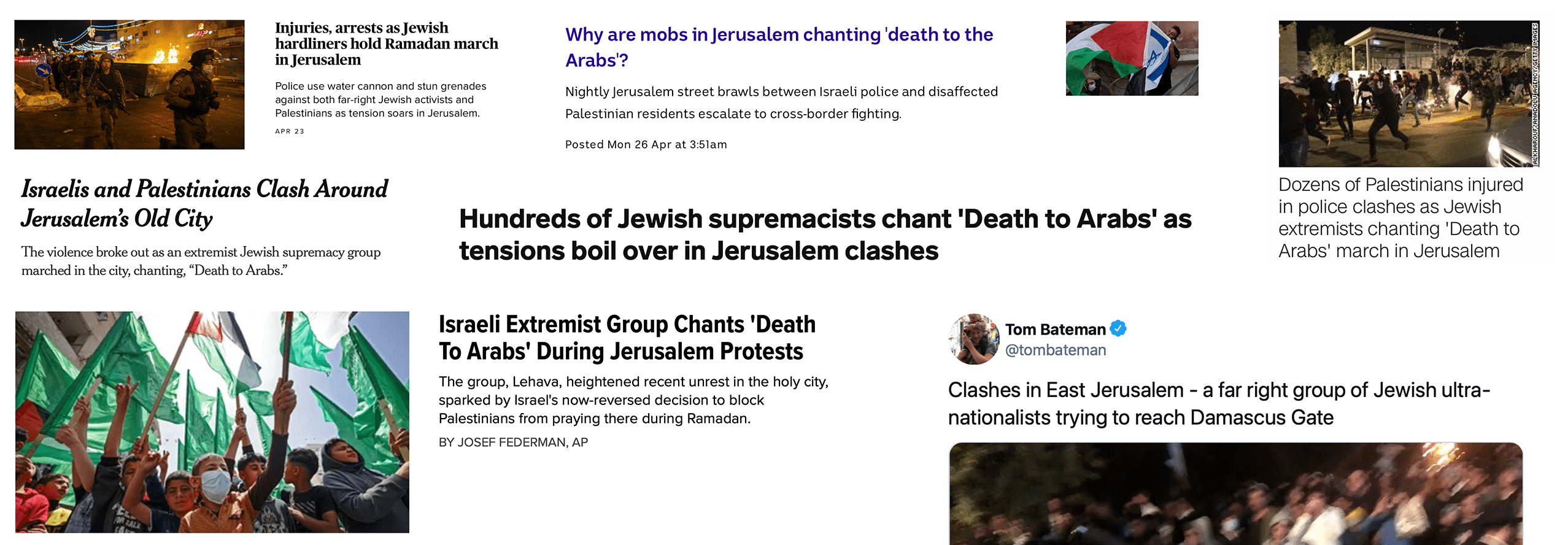Coinciding with the Islamic fasting month of Ramadan, the streets of Jerusalem have for the past two weeks been plagued by increasingly violent Palestinian protests. Night after night, hundreds of Palestinians, some of them hurling fireworks, rocks, and petrol bombs, have clashed with Israeli police. The riots have left dozens of police officers injured, and several innocent Israeli civilians have been brutally attacked by Palestinian mobs.
Nevertheless, many news outlets only reported on the Jerusalem violence after a widely condemned march was organized by a far-right, fringe Israeli group.
But beyond the “blame Israel” narrative, what was really behind the escalation in Jerusalem?
The “TikTok Intifada”
Palestinian violence began intensifying following a disturbing online challenge. On April 15, the second day of Ramadan, a Palestinian man attacked two ultra-orthodox Israeli boys on the Jerusalem light rail. The footage of the unprovoked attack went viral on the video-sharing app TikTok. In the days that followed, more and more clips of attacks on Israeli civilians started appearing on the platform.
The alarming development was quickly dubbed the “TikTok Intifada,” a reference to the Arabic term for a violent uprising. “There is a competition for likes and views,” a 15-year old victim told the Israeli Ynet news organization last week. “A video of an Arab slapping an ultra-Orthodox man will get you both.”
Wow this is a new low – Arab youth in Jerusalem assault an elderly Jewish couple walking home from synagogue and then post to @tiktok_us for likes! pic.twitter.com/xyuRTz4Q1c
— StopAntisemitism.org (@StopAntisemites) April 26, 2021
Unreported: 200% Increase in Terrorism During Ramadan
By contrast, the Palestinians — and the media — have ostensibly attributed the violence to a decision by Israeli police to manage the flow of pedestrian traffic into Jerusalem’s Old City by placing barricades in front of the square leading to Damascus Gate. Palestinian factions in the Gaza Strip called the move a “battle against settlements and attempts to Judaize [Jerusalem].” For his part, Palestinian Authority Prime Minister Mohammad Shtayyeh hailed the rioting as “scenes of heroism emerging from the streets and alleys of the city of Jerusalem… [that] confirm once again the failure of Israeli plans to Judaize the Holy City.”
Meanwhile, Ayman Odeh, head of Israel’s Joint Arab List, which holds a sizeable six seats in parliament, also incited violence: “This [the clashes] will be the case until the intifada comes to end the occupation and hoist the Palestinian flag above the Al-Aqsa mosque, above the churches and above the gates of Jerusalem,” he said.
Lost in the mix is that Israeli police chief Kobi Shabtai made explicit that “the status quo forbidding people from sitting in the area around the Damascus Gate has existed for over a decade.” What also went unreported is the fact that there is almost always an uptick in Palestinian violence during Ramadan, with historical data indicating a 200 percent increase in terrorist attacks.
Then there is internal Palestinian politics to consider. For the Hamas terrorist group, which controls Gaza, as well as Palestinian Authority President Mahmoud Abbas, who essentially governs the West Bank by fiat, the unrest has provided a convenient excuse to deflect attention away from the problems they are facing ahead of scheduled legislative elections.
Related Reading: Press Gears Up for Possible Palestinian Election Postponement… By Preemptively Blaming Israel
Mainstream Media Wake Up
Then came April 22, when a far-right protest was organized by the Israeli group Lehava. Some 300 Israeli Jews, mostly young men, marched towards Damascus Gate. Although participants told journalists they were demonstrating against ongoing attacks on Jewish residents, they shouted unacceptable racist slogans, including “Death to the Arabs.” Others hurled stones and set trash cans ablaze.
Thankfully, police managed to disperse the extremists before they reached Palestinians who were again rioting.
“We allow protest in the name of freedom of expression, but we will take action against any form of violence,” a police statement said ahead of the Lehava initiative. Mayor Moshe Lion reportedly tried to prevent the event but police told him there was no legal basis to do so.
Moreover, Israeli politicians quickly condemned the incident. “We maintain the freedom of worship as every year, for all residents and all visitors to Jerusalem,” Prime Minister Benjamin Netanyahu stressed, adding: “We demand compliance with the law, and I call for calm on all sides.”
Whereas a week had passed since the start of the “TikTok Intifada,” many mainstream media only began paying attention to the riots in Jerusalem following the Lehava march. And the headlines that emerged were devoid of crucial context. The Huffington Post published an article titled, “Israeli Extremist Group Chants ‘Death To Arabs’ During Jerusalem Protests.” ABC News in Australia ran the story under the similar headline, “Why are mobs in Jerusalem chanting ‘death to the Arabs’?“
CNN, CBS News and several others followed in stride. The first paragraph of a New York Times article included the sentence: “The violence broke out as an extremist Jewish supremacy group marched in the city.” Vice News noted that “Palestinian authorities voiced their concern over the growing violence from the far-right groups,” but notably omitted the part of the statement in which PA President Abbas praised the Palestinian rioters for their “steadfastness in the face of Israeli schemes aiming to control the holy city.”

Where were these media outlets when Palestinians were assaulting Jews in a concerted campaign? Where were they when Eli Rozen, a Jewish resident of Jerusalem, was almost beaten to death by a Palestinian mob? When Yahya Jardi was chased by multiple attackers, kicked to the ground, and had his car set on fire?
Instead of painting the full picture of the story, media seemingly jumped at the opportunity the smear Israel over the despicable actions of a radical organization that were immediately denounced by Israeli leaders.
As a result, the Palestinians have again been depicted as victims without any agency — a lie that, ironically, does not benefit them in any way, shape or form. It does not serve to bring peace closer; rather, only to portray Israel — an admittedly imperfect country with imperfect citizens — in an inaccurate light.
Featured Image: Ahmad Gharabl via AFP/Getty


